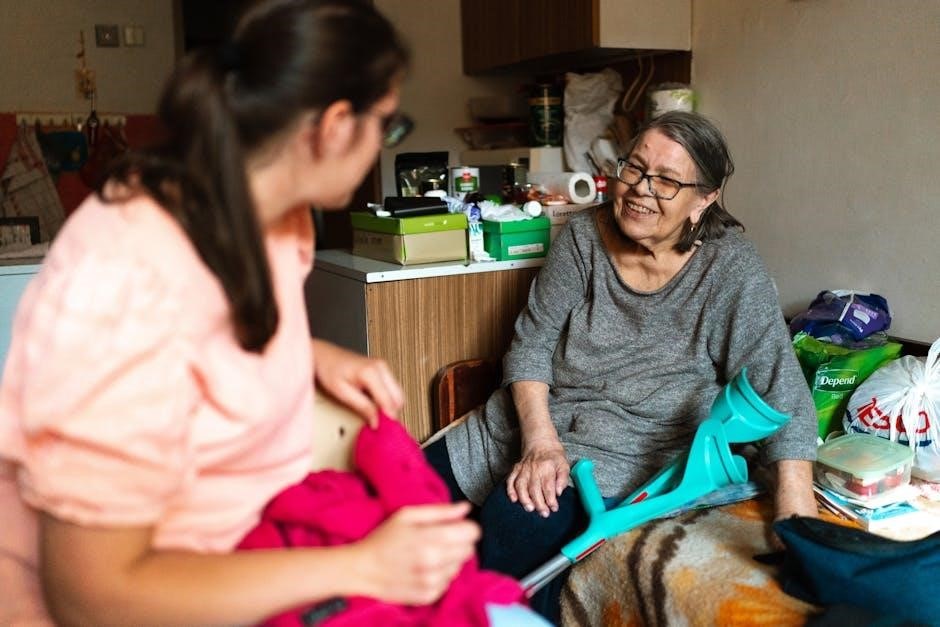
Nursing assisting is a vital role in healthcare‚ providing essential support through direct patient care. This section introduces the foundational skills and responsibilities‚ emphasizing adaptability across care settings and the importance of balancing clinical expertise with compassionate interaction to meet evolving patient needs.
Overview of the 6th Edition
The 6th edition of Nursing Assisting: A Foundation in Caregiving offers comprehensive updates to align with modern healthcare standards. It incorporates new content on technology integration‚ patient-centered care‚ and pandemic response‚ ensuring relevance in today’s clinical environments. The textbook retains its body system organization‚ providing a logical framework for learning. Enhanced features include case studies‚ evidence-based practices‚ and expanded cultural competency discussions. This edition reflects the evolving role of nursing assistants‚ equipping students with the skills and knowledge needed for effective caregiving in diverse settings. It remains a cornerstone resource for both learners and educators in the field.
Importance of Nursing Assistant Training
Nursing assistant training is crucial for delivering high-quality‚ patient-centered care. It equips individuals with essential skills to support diverse patient needs‚ ensuring safety and dignity. Proper training fosters adaptability in various healthcare settings‚ from hospitals to home care. It emphasizes evidence-based practices‚ cultural competence‚ and effective communication. Well-trained nursing assistants play a vital role in addressing workforce shortages and improving patient outcomes. This training also enables them to collaborate effectively with healthcare teams‚ providing compassionate and personalized care. Investing in nursing assistant education is key to building a resilient and responsive healthcare system. It ensures a strong foundation for both patient care and professional growth.
Key Features of the 6th Edition
Includes enhanced content‚ updated guidelines‚ and new case studies. Organized by body systems for better comprehension. Features improved visuals and practical applications for real-world caregiving scenarios.
New Content and Updates
The 6th edition introduces updated clinical guidelines and expanded content on modern caregiving practices. It features new case studies reflecting real-world scenarios and enhanced visuals for better understanding. The edition incorporates the latest advancements in patient-centered care and technology integration. Additionally‚ it addresses emerging topics such as caregiver shortages and ethical considerations in healthcare. These updates ensure nursing assistants are well-prepared to meet the evolving demands of the healthcare industry while providing compassionate and effective care.
Organization by Body Systems
The 6th edition is structured around body systems‚ providing a logical framework for learning. This organization allows nursing assistants to understand the interconnections between anatomical and physiological processes. Each chapter focuses on a specific system‚ such as cardiovascular‚ respiratory‚ or neurological‚ enabling a comprehensive understanding of patient care. This approach helps students identify how conditions in one system can affect others‚ promoting holistic care delivery. The body systems format aligns with clinical practices‚ making it easier for nursing assistants to apply knowledge in real-world settings and adapt to patient needs effectively.
Accessing the 6th Edition
The 6th edition is available in PDF format for easy access and portability. It can be legally purchased or accessed through authorized educational platforms or retailers online.
Availability of the PDF Version
The 6th edition of Nursing Assisting: A Foundation in Caregiving is widely available in PDF format‚ offering convenience and portability for learners. This digital version can be accessed through various online retailers‚ educational platforms‚ and publisher websites. It is designed to facilitate easy navigation‚ with features like searchable text and adjustable fonts. Students and instructors can download the PDF to study on multiple devices‚ making it ideal for modern learning environments. Always ensure to purchase from authorized sources to comply with copyright laws and support the publisher. This format enhances accessibility and flexibility for both individual and institutional use.
Legal and Ethical Considerations for Free Access

Accessing copyrighted materials like the 6th edition PDF without authorization raises legal and ethical concerns. Copyright laws protect intellectual property‚ and distributing or downloading such materials without permission is illegal. Ethically‚ respecting the efforts of authors and publishers is crucial. Free access may seem convenient but undermines the publishing industry and the quality of educational resources; Always obtain materials through legitimate channels to support creators and comply with legal standards. Unauthorized sharing or downloading violates copyright laws‚ such as the Digital Millennium Copyright Act‚ and can lead to penalties.
Foundational Concepts in Caregiving

Effective caregiving relies on empathy‚ respect‚ and understanding patient needs. Core principles include promoting dignity‚ ensuring safety‚ and fostering a supportive environment for physical and emotional well-being.
Principles of Patient-Centered Care
Patient-centered care focuses on respecting patients’ preferences‚ values‚ and needs. It emphasizes dignity‚ autonomy‚ and individualized care‚ ensuring patients are active participants in their care plans. This approach prioritizes clear communication‚ empathy‚ and shared decision-making. By understanding patients’ unique circumstances‚ caregivers can tailor interventions to meet specific requirements. Patient-centered care fosters trust and satisfaction‚ leading to better health outcomes. It also encourages collaboration among healthcare providers to deliver coordinated and compassionate support. This principle is fundamental in nursing assisting‚ ensuring care is holistic and aligned with patient goals.
Communication Skills for Nursing Assistants
Effective communication is essential for nursing assistants to deliver high-quality care. Clear verbal and non-verbal interactions ensure understanding and build trust between patients and caregivers. Active listening‚ empathy‚ and culturally sensitive language are key components. Nursing assistants must adapt communication strategies to meet patients’ diverse needs‚ including those with cognitive or sensory impairments. Open dialogue also facilitates collaboration with healthcare teams‚ reducing misunderstandings and improving care coordination. Strong communication fosters a supportive environment‚ enhancing patient satisfaction and outcomes. It is a cornerstone of patient-centered care and professional success in nursing assisting.

Role of Nursing Assistants in Modern Healthcare
Nursing assistants play a crucial role in modern healthcare‚ providing essential support and direct patient care. Their responsibilities have expanded to include monitoring vital signs‚ assisting with daily activities‚ and collaborating with healthcare teams to ensure holistic care delivery. This role is vital in improving patient outcomes and satisfaction.
Evolving Responsibilities in Care Delivery
The role of nursing assistants has expanded significantly‚ adapting to the changing needs of modern healthcare. Today‚ they are integral in monitoring vital signs‚ assisting with medical procedures‚ and providing emotional support to patients; With advancements in technology‚ nursing assistants now use digital tools for documentation and patient monitoring. Additionally‚ there is a growing emphasis on managing chronic diseases and promoting preventive care. Collaboration with interdisciplinary teams has become essential‚ ensuring comprehensive care delivery. These evolving responsibilities highlight the critical need for continuous education and skill development to meet the demands of contemporary healthcare systems effectively.
Collaboration with Formal and Informal Caregivers
Collaboration between nursing assistants‚ formal caregivers‚ and informal caregivers is crucial for delivering holistic patient care. Nursing assistants often serve as a bridge‚ ensuring consistent communication and coordination among all parties. This teamwork enhances patient outcomes by addressing both medical and emotional needs. Informal caregivers‚ such as family members‚ provide valuable insights into the patient’s preferences and daily routines. By fostering mutual respect and open dialogue‚ nursing assistants can integrate these perspectives into care plans. This collaborative approach not only improves care quality but also supports the well-being of both patients and their families‚ creating a more cohesive care environment.

Future Trends in Nursing Assisting
Future trends include integrating technology‚ such as telehealth‚ and focusing on specialized care areas like gerontology and rehabilitation. There is also a growing emphasis on cultural competence and sustainability in caregiving practices to meet diverse patient needs effectively.
Impact of Technology on Caregiving
Technology is transforming caregiving by enhancing patient monitoring and streamlining care delivery. Tools like telehealth platforms and electronic health records improve communication and data accessibility. Wearable devices enable real-time health tracking‚ while AI assists in predicting patient needs. These innovations not only boost efficiency but also empower caregivers to provide personalized‚ evidence-based care. Additionally‚ technology fosters collaboration between formal and informal caregivers‚ ensuring a cohesive approach to patient support. As digital advancements continue‚ the integration of technology in caregiving will play a pivotal role in addressing the growing demand for high-quality‚ patient-centered care in diverse healthcare settings.
Addressing the Growing Demand for Caregivers
The demand for skilled caregivers is rising due to aging populations and increased chronic disease prevalence. Nursing assistants play a critical role in bridging this gap‚ providing essential support in diverse healthcare settings. To meet this demand‚ healthcare systems are focusing on recruitment‚ retention‚ and training programs. Emphasizing caregiver well-being and addressing burnout are equally important. Collaborative efforts between formal and informal caregivers‚ along with community-based initiatives‚ are essential. Standardized training resources‚ such as the 6th Edition‚ help prepare caregivers to deliver high-quality‚ patient-centered care‚ ensuring they are equipped to meet the challenges of a growing healthcare landscape.